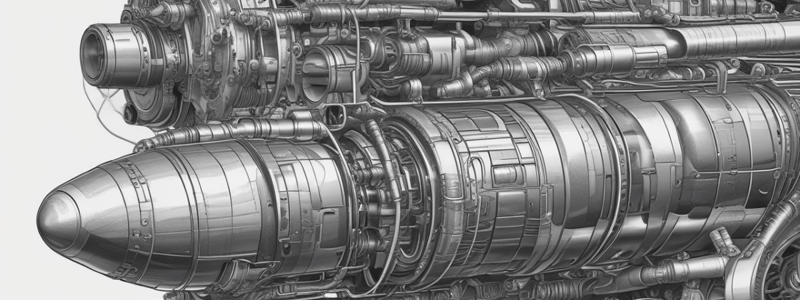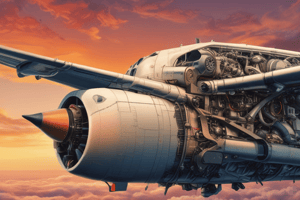Podcast
Questions and Answers
What role does the oil film play in the lubrication system of an engine?
What role does the oil film play in the lubrication system of an engine?
- It cushions contact between gears. (correct)
- It absorbs heat from the engine components.
- It acts as a lubricant only during cold starts.
- It enhances fuel combustion efficiency.
How does oil contribute to reducing engine wear?
How does oil contribute to reducing engine wear?
- By increasing the viscosity of fuel.
- By preventing fuel vapors from escaping.
- By lowering the engine temperature.
- By cleaning particles and contaminants. (correct)
What is a significant advantage of synthetic lubricants in gas turbine engines?
What is a significant advantage of synthetic lubricants in gas turbine engines?
- They are cheaper than petroleum-based lubricants.
- They evaporate more quickly under high temperatures.
- They have a lower flash point compared to petroleum oils.
- They retain their characteristics at high temperatures. (correct)
What effect does the oil film have on metal engine parts exposed to moist air?
What effect does the oil film have on metal engine parts exposed to moist air?
What happens to foreign particles suspended in oil as it circulates through the engine?
What happens to foreign particles suspended in oil as it circulates through the engine?
Which of the following is NOT a characteristic of synthetic lubricants?
Which of the following is NOT a characteristic of synthetic lubricants?
What type of corrosion can the oil film help prevent in engine parts?
What type of corrosion can the oil film help prevent in engine parts?
Which aspect of engine operation necessitated the development of synthetic lubricants?
Which aspect of engine operation necessitated the development of synthetic lubricants?
What is the primary purpose of a lubricant in an aircraft engine?
What is the primary purpose of a lubricant in an aircraft engine?
Which of the following documents can you refer to for the correct oil specification for an engine type?
Which of the following documents can you refer to for the correct oil specification for an engine type?
Why must oils with different specifications and brand names never be mixed?
Why must oils with different specifications and brand names never be mixed?
In what way do the metal surfaces inside an aircraft engine appear under microscopic examination?
In what way do the metal surfaces inside an aircraft engine appear under microscopic examination?
What role does lubricating oil play concerning engine bearings?
What role does lubricating oil play concerning engine bearings?
How does lubricating oil protect engine components from corrosion?
How does lubricating oil protect engine components from corrosion?
What happens when engine parts rub against one another without proper lubrication?
What happens when engine parts rub against one another without proper lubrication?
What characteristic of liquid lubricants makes them widely used in aircraft engines?
What characteristic of liquid lubricants makes them widely used in aircraft engines?
What can occur if the vapor pressure of fuel is too high?
What can occur if the vapor pressure of fuel is too high?
What is the typical flash point of JET A-1 fuel?
What is the typical flash point of JET A-1 fuel?
Which of the following statements about vapor pressure is correct?
Which of the following statements about vapor pressure is correct?
What is the primary method to detect fuel contamination?
What is the primary method to detect fuel contamination?
Why is swarf a concern in fuel management?
Why is swarf a concern in fuel management?
Which fuel has a flash point of -40 °C?
Which fuel has a flash point of -40 °C?
What risk is associated with using AVGAS compared to JET A-1 in the event of a fuel spill?
What risk is associated with using AVGAS compared to JET A-1 in the event of a fuel spill?
What role does flash point play in the safety of fuels?
What role does flash point play in the safety of fuels?
What form of water is present in aviation turbine fuel that cannot be detected visually?
What form of water is present in aviation turbine fuel that cannot be detected visually?
Where does free water typically settle in an aircraft fuel system?
Where does free water typically settle in an aircraft fuel system?
What can happen to free water in the fuel under certain conditions?
What can happen to free water in the fuel under certain conditions?
How is settled free water typically detected in JET A-1 fuel?
How is settled free water typically detected in JET A-1 fuel?
What is a method for checking for suspended or entrained water in aircraft fuel tanks?
What is a method for checking for suspended or entrained water in aircraft fuel tanks?
Which statement about the types of water in aviation fuel is correct?
Which statement about the types of water in aviation fuel is correct?
What does the color change of water detection paste indicate?
What does the color change of water detection paste indicate?
When are aircraft fuel tanks typically checked for water contamination?
When are aircraft fuel tanks typically checked for water contamination?
What primarily influences the amount of oil consumed in a gas turbine engine?
What primarily influences the amount of oil consumed in a gas turbine engine?
Which statement is true regarding synthetic oils?
Which statement is true regarding synthetic oils?
What is a characteristic of jet fuels as mentioned?
What is a characteristic of jet fuels as mentioned?
Which of the following is a caution when handling synthetic oils?
Which of the following is a caution when handling synthetic oils?
What combination of factors usually leads to higher oil consumption in turbine engines?
What combination of factors usually leads to higher oil consumption in turbine engines?
What potential hazard is associated with synthetic oils?
What potential hazard is associated with synthetic oils?
What is the consequence of using silicon-based grease in oil system O-rings?
What is the consequence of using silicon-based grease in oil system O-rings?
Which of the following statements about turbine engine fuels is correct?
Which of the following statements about turbine engine fuels is correct?
Flashcards are hidden until you start studying
Study Notes
Aircraft Engine Oils
- Properties and characteristics of lubricating oils vary by type; using incorrect oil can damage engine components.
- Verify correct oil specifications in the Aircraft Operator’s Manual, Aircraft Maintenance Manual, Engine Maintenance Manual, and oil tank service placard.
- Mixing oils with different specifications and brand names is prohibited.
Lubrication Functions
- Lubricants reduce friction, cool engine bearings, seal and cushion moving parts, as well as clean the interior and protect against corrosion.
- Liquid lubricants, particularly oils, are most commonly used due to their ability to circulate freely.
- Engine parts have microscopically rough surfaces; lubrication oil creates a protective film to minimize friction.
Cleaning and Maintenance
- Oil acts as a cleaning agent, accumulating dirt, dust, carbon, and water, which are removed by filters during circulation.
- Oils help reduce engine wear by trapping foreign particles and carrying them to filtration systems.
Corrosion Protection
- Engine parts exposed to moisture and chemicals risk corrosion; oil film creates a barrier against oxygen and moisture.
Synthetic Oil Characteristics
- Synthetic lubricants developed for high-temperature operation in gas turbine engines retain properties better than petroleum oils.
- Synthetic oils reduce the formation of coking, lacquer, and deposits from high temperatures.
Oil Consumption Factors
- Oil consumption varies based on engine RPM, temperature, operating clearances, and lubricant characteristics.
- Higher RPM and temperatures lead to increased oil consumption rates, as well as larger clearances and lower viscosity.
Handling and Safety Precautions
- Synthetic oils may be hazardous; read Safety Data Sheets (SDS) and use personal protective equipment (PPE).
- Avoid using silicon-based grease with oil system O-rings to prevent contamination; clean spills immediately to protect surfaces.
Turbine Engine Fuels
- Jet fuels are liquid hydrocarbons, often similar to kerosene and mixed with gasoline for military applications.
- High vapor pressure can lead to vapor locks in fuel lines; specific pressures for JET A-1 (0.1 - 0.5 psi) and AVGAS (about 7 psi) are crucial.
Flash Point
- Flash point is the temperature at which fuel emits ignitable vapors; higher flash points indicate lower fire hazards.
- Typical flash points include JET A-1 at 38 °C and AVGAS at -40 °C; fuel spills create different ignition risks based on these values.
Fuel Management and Contamination
- Contaminants include any foreign materials in fuel, with water being a significant concern.
- Visual inspection of fuel samples in clear containers helps detect free water, a common contaminant that settles at the lowest points.
Water Presence in Fuel
- Aviation turbine fuel is hygroscopic, meaning water is often present due to condensation.
- Water exists in two forms: dissolved (undetectable visually) and free (suspended water).
- Routine checks of aircraft tanks for free water before flights are essential; fuel samples are taken from drain valves to detect settled water.
Studying That Suits You
Use AI to generate personalized quizzes and flashcards to suit your learning preferences.




